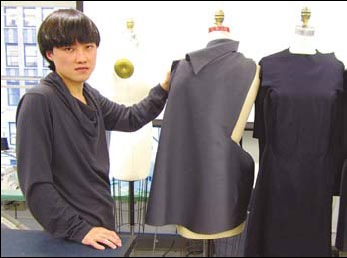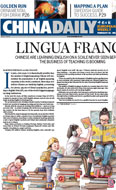People
Daring to be different
Updated: 2011-02-22 07:54
By Kelly Chung Dawson (China Daily)
|
Chinese designer Zhao "Wen" Qianyan poses with some of his works in New York. |
Fortunately for him, the respect was mutual. Collins, who has participated as a judge in both seasons so far, says Zhao was a clear winner of the first season.
"He's very, very talented," he says. "He was doing some wonderful experimental pattern cutting, really playing with people's perceptions of what a garment should really be. He was confounding people's expectations, and he was the only one in the competition who had a grasp of what a cohesive collection was. It was an easy decision."
Lam was also impressed with the work he saw in the competition, he says. "There is no doubt that Chinese fashion designers have skills as mature as foreign designers," he says. "Before the show I had seen some work of the local designers and I was amazed at the craftsmanship and their desire to create something different. That is why I accepted the invitation (to judge the show)."
Cross-cultural interaction is important in fashion, Lam says. "As a designer, it's always beneficial to be exposed to different cultures. You will feel inspired and be encouraged to explore new things. It not only applies to Chinese designers going abroad to study fashion but also to Western designers visiting Asia."
Zhao's goals for his time abroad include making the most of Parsons' real-life hands-on approach to more than just conceptual design, he says. "I know that if I draw something I can make it, but the problem for me is that I need to learn more about marketing. If you don't know how to market and sell your clothing, it might as well be worth nothing. Here at Parsons we learn from big designers, and we learn real things."
He intends to work in the United States or London after graduation, but also has plans for a showroom in China, where the fashion market is only just beginning, he says.
However, he still believes that there is more opportunity in the West, he says. "In America and London, you will be valued. What's most important in China is not your talent or your skill. It's about your relationships," he says. "But here in America, if you are really good, you can be famous."
Part of the problem for Chinese designers in China is the education system itself, he says. "Many Chinese people who want to study fashion forget that 'creativity' is the key word, not 'following'. There is a lack of creativity not only in fashion but also with computers, mobile phones and other areas where everything is copied."
Collins agrees. "I do think there's a certain reluctance to stand out in Chinese education and among young Chinese designers. I'm not advocating prima donna behavior, but I do think that people should be confident enough in what they're doing to make a statement and push the boundaries. I don't think that's as natural in China as it is in the West."
Zhao saw examples of duplication in the show, he says. "I think that some of the other contestants did work that was similar to other fashion designers' collections," he says. "When we got an assignment, people would search for other people's work. I don't think you should do that."
Zou believes that it's not a lack of creativity that Chinese designers face. "There are plenty of very creative and artistic individuals in China," he says. "The issue is more in the lack of exposure and awareness. We shouldn't forget that not so long ago, everyone in China was wearing the same gray suit. But things are changing extremely rapidly today."
Zhao encountered many strong designers in the show. "There were many good competitors, even if they all hated me," he says with a laugh. He often clashed with other contestants. But not with Yang Yang, a fellow designer he met on the television show and fell in love with. They are now happily married - one more reason he feels lucky, he says.
Later, standing beside examples of his work, Zhao reveals more of the force of personality that drove him to win the competition and will likely fuel his success in the fashion world. "I do what I want to do, and I say what I want to say, even if my language will make someone angry," he says. "I think there's a revolution going on in fashion, and I believe I am different. I'm simply myself."
E-paper

Lingua franca
Chinese are learning English on a scale never seen before and the business of teaching is booming.
Golden run ahead
Looking abroad
Mapping out a plan
Specials

Sentimental journey
Prince William and Kate Middleton returned to the place where they met and fell in love.

Rent your own island
Zhejiang Province charts plans to lease coastal islands for private investments

Self-made aircraft
An automobile mechanic in Northeast China made a test flight of his self-made aircraft which cost about US$395.

